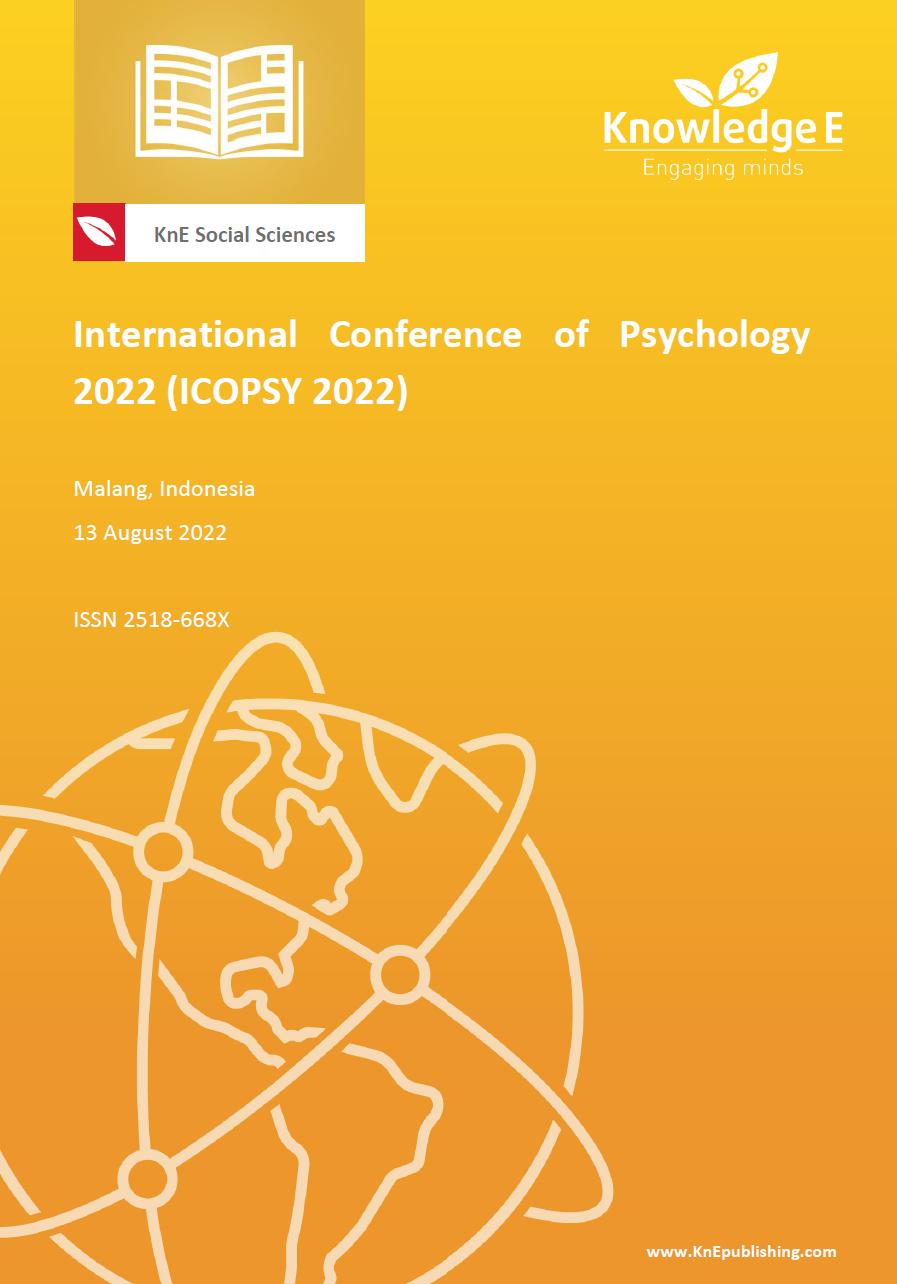The Correlation Between Social Support and Adversity Quotient in Young Mothers with 0-1 Year Old Babies During The Covid-19 Pandemic
DOI:
https://doi.org/10.18502/kss.v7i18.12378Abstract
Infant mortality is one of the world’s most serious health problems. Under normal conditions, infant mortality in Indonesia is still a serious concern and is increasingly becoming a major challenge, especially in the current pandemic situation. The government has designated COVID-19 as a national nonnatural disaster and stated that there was an increase in infant mortality during the pandemic. One of the factors in the high number of infant mortality is early marriage. The initial interview indicated that some mothers experience problems and anxiety in caring for babies aged 0-1 years during the COVID-19 pandemic which is expected to affect the mental health of mothers. The study aimed to find out the adversity quotient and social support in young mothers with children aged 0-1 years during the covid-19 pandemic, and to find out the relationship between adversity quotient and social support. The methods used in this research are descriptive analysis and correlational analysis. The sample number in the study was 124 respondents. The measurement instruments in this study were 50 items on the adversity quotient scale and 12 items on social support scales that had a reliability of .969 and .915, respectively. The results showed that most young mothers with children 0-1 years old during the pandemic had adversity quotient and social support that belonged to the high category. There is a positive and significant association between social support and quotient adversity in young mothers with children 0-1 years old during the pandemic times. Keywords: social support, adversity quotien
References
[2] Pradana Anung, Caesman, Nuraeni. Pengaruh kebijakan social distancing pada wabah Covid-19 terhadap kelompok rentan di Indonesia. Jurnal kebijakan Kesehatan Indonesia. 2020;9(2):61-67. https://doi.org/10.22146/jkki.55575
[3] Diskominfo.jemberkab.go.id. Kasih Fajarini Ajak Seluruh Masyarakat Sosialisasikan Senam Perwosi. 2021. Retrieved July 29, 2022 from Kasih Fajarini Ajak Seluruh Masyarakat Sosialisasikan Senam Perwosi ( jemberkab.go.id)
[4] Unicef.org. Child Marriage. Retrieved July 29, 2022 from Child marriage | UNICEF
[5] Cameron EE, Joyce KM, Delaquis CP, Reynolds K, Protudjer J, Roos LE. Maternal psychological distress & mental health service use during the COVID-19 pandemic. Journal of Affective Disorders. 2020;76:765–774. https://doi.org/10.1016/j.jad.2020.07.081
[6] Yuliani DR, Aini FN. Kecemasan ibu hamil dan ibu nifas pada masa pandemi Covid-19 di kecamatan Baturraden. Jurnal Sains Kebidanan. 2020;2(2):11-14. https://doi.org/10.31983/jsk.v2i2.6487
[7] Khairunnisa D, Hidayanti N, Setiawan. Tingkat stres pada remaja wanita yang menikah dini di kecamatan Babakancikao kabupaten Purwakarta. Jurnal Ilmu Keperawatan. 2016;4(2):67-76. https://doi.org/10.31311/.v4i2.857
[8] Tyas FPS, Herawati T. Kualitas pernikahan dan kesejahteraan keluarga menentukan kualitas lingkungan pengasuhan anak pada pasangan yang menikah usia muda. Jurnal Ilmu Keluarga dan Konsumen. 2017;10(1):1-12. http://dx.doi.org/10.24156/jikk.2017.10.1.1
[9] Stoltz PG. Adversity quotient : Mengubah hambatan menjadi peluang. Jakarta: PT Grasindo; 2006.
[10] Putri D. Hubungan antara dukungan sosial dengan adversity quotient pada wirausahawan [Unpublished undergraduate thesis]. Fakultas Psikologi. Malang: Universitas Negeri Malangi; 2016.
[11] Cahyaningsih A. Daya juang wanita single parent yang mengalami perceraian dalam memenuhi kebutuhan hidup [Unpublished undergraduate thesis]. Surakarta: Fakultas Psikologi. Universitas Muhammadiyah Surakarta; 2018.
[12] Sarafino EP, Smith TT. Health psychology biopsychosocial interactions. New York: John Wiley & Sons; 2010.
[13] Purwanti D, Fitriasih, Istiaroh. Dukungan sosial keluarga dan hubungannya dengan kecemasan ibu primapara dalam merawat bayi berat badan lahir rendah. Prosiding Seminar Nasional Keperawatan. 2014;249-254.
[14] Hastuti TD, Sari DR, Riyadi. Student profile with high adversity quotient in math learning. Journal of Physics: Conference Series. 2017;983(1). https://doi.org/10.1088/1742- 6596/983/1/012131
[15] Diana N. Studi deskriptif tentang adversity quotient pada siswa kelas akselerasi di Sekolah Menengah Atas Negeri 1 Malang [Unpublished undergraduate thesis]. Fakultas Psikologi. Malang: Universitas Islam Negeri Malang; 2008.
[16] Maslihah S. Studi tentang hubungan dukungan sosial, penyesuaian sosial di lingkungan sekolah dan prestasi akademik siswa SMPIT Assyfa Boarding School Subang Jawa Barat. Jurnal Psikologi Undip. 2011;10(2):103-114.
[17] Zimet GD. The multi dimentional scale of perceived social support. Journal of personality assessment. 1988;52(1):30-41. https://doi.org/10.1207/s15327752jpa5201_2
[18] Azwar S. Reliabilitas dan validitas. Yogyakarta: Pustaka Belajar; 2012
[19] Eva N, Bisri M. Dukungan sosial, religiusitas, dan kesejahteraan psikologis mahasiswa cerdas istimewa. Proseding Seminar Nasional Klinis 2018. 2018. Retrieved from http://fppsi.um.ac.id/wp-content/uploads/2018/12/12.-Nur-eva.pdf.
[20] Hibana. Meningkatkan ketahanan keluarga di masa pandemi Corona. Fakultas Tarbiyah dan Keguruan. Yogyakarta: Universitas Islam Negeri Sunan Kalijaga Yogyakarta; 2020.
[21] Yulianti N. Hubungan adversity quotient dengan resiliensi ibu yang memiliki anak Autis di Banda Aceh [Unpublished undergraduate thesis]. Fakultas Psikologi. Aceh: Universitas Islam Negeri Ar-raniry; 2020.
[22] Annisatuliza K. Daya juang orang tua anak autis [Unpublished undergraduate thesis]. Fakultas Psikologi. Surakarta: Universitas Muhammadiyah Surakarta; 2020.
[23] Puspasari D, Kuwanto T, Wiyaya H. Dukungan sosial dan adversity quotient pada remaja yang mengalami transisi sekolah. Psikologika. 2012;17(01):69-75. https://doi.org/10.20885/psikologika.vol17.iss1.art8
[24] Saleha S. Asuhan kebidanan pada masa Nifas. Jakarta: Salemba Medika; 2009.
[25] Sylvia De. Depresi pasca persalinan. Jakarta: FK UI; 2006.

